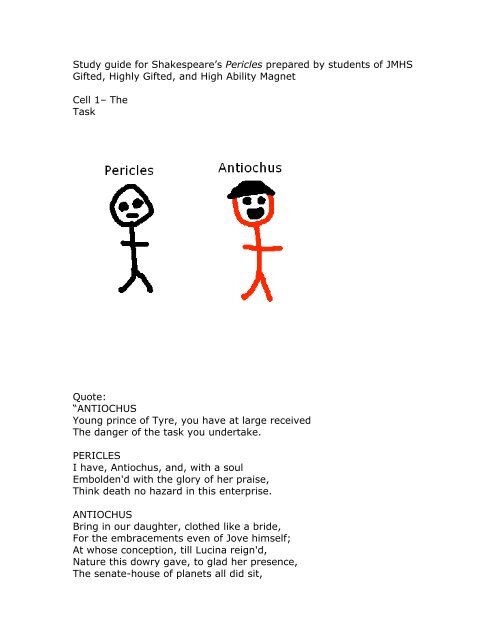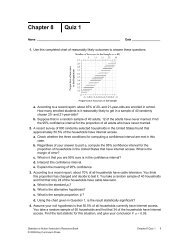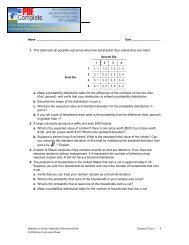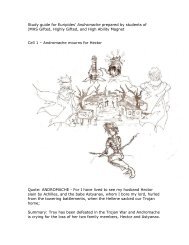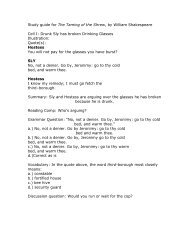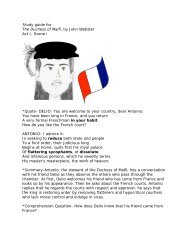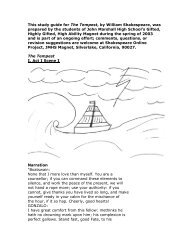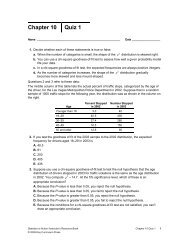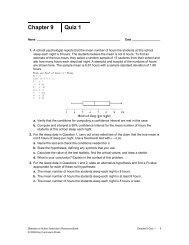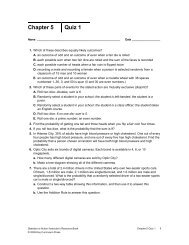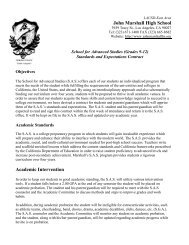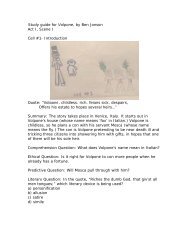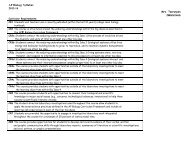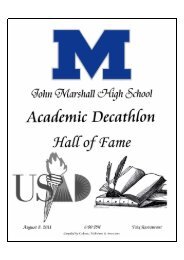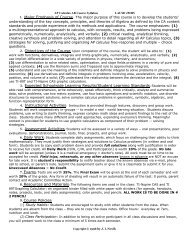Study guide for Shakespeare's Pericles prepared by students of ...
Study guide for Shakespeare's Pericles prepared by students of ...
Study guide for Shakespeare's Pericles prepared by students of ...
- No tags were found...
Create successful ePaper yourself
Turn your PDF publications into a flip-book with our unique Google optimized e-Paper software.
CReAM Discussion Paper No 10/06Ethnic Minority Immigrants and their Children in BritainChristian Dustmann† and Nikolaos Theodoropoulos‡† Department <strong>of</strong> Economics and Centre <strong>for</strong> Research andAnalysis <strong>of</strong> Migration(CReAM), University College London.‡ Centre <strong>for</strong> Research and Analysis <strong>of</strong> Migration(CReAM),University College London.Non-Technical AbstractAccording to the 2001 UK Census ethnic minority groups account <strong>for</strong> 4.6 million or7.9 percent <strong>of</strong> the total UK population. The 2001 British Labour Force Surveyindicates that the descendants <strong>of</strong> Britain’s ethnic minority immigrants <strong>for</strong>m animportant part <strong>of</strong> the British population (2.8 percent) and <strong>of</strong> the labour <strong>for</strong>ce (2.1percent). In this paper, we use data from the British Labour Force Survey over theperiod 1979-2005 to investigate educational attainment and economic behaviour <strong>of</strong>ethnic minority immigrants and their children in Britain. We compare different ethnicminority groups born in Britain to their parent’s generation and to equivalent groups<strong>of</strong> white native born individuals. Intergenerational comparisons suggest that Britishborn ethnic minorities are on average more educated than their parents as wellmore educated than their white native born peers. Despite their strong educationalachievements, we find that ethnic minority immigrants and their British born childrenexhibit lower employment probabilities than their white native born peers. However,significant differences exist across immigrant/ethnic groups and genders. Britishborn ethnic minorities appear to have slightly higher wages than their white nativeborn peers. But if British born ethnic minorities were to face the white nativeregional distribution and were attributed white native characteristics, their wageswould be considerably lower. The substantial employment gap between British bornethnic minorities and white natives cannot be explained <strong>by</strong> observable differences.We suggest some possible explanations <strong>for</strong> these gaps.Centre <strong>for</strong> Research and Analysis <strong>of</strong> MigrationDepartment <strong>of</strong> Economics, Drayton House, 30 Gordon Street, London WC1H 0AXTelephone Number: +44 (0)20 7679 5888Facsimile Number: +44 (0)20 7916 2775
Cell 2 – The RiddleQuote:"PERICLESLike a bold champion, I assume the lists,Nor ask advice <strong>of</strong> any other thoughtBut faithfulness and courage.He reads the riddleI am no viper, yet I feedOn mother's flesh which did me breed.I sought a husband, in which labourI found that kindness in a father:He's father, son, and husband mild;I mother, wife, and yet his child.How they may be, and yet in two,As you will live, resolve it you.Sharp physic is the last: but, O you powersThat give heaven countless eyes to view men's acts,Why cloud they not their sights perpetually,If this be true, whichmakes me pale to read it?Fair glass <strong>of</strong> light, I loved you, and could still,
Takes hold <strong>of</strong> the hand <strong>of</strong> the Daughter <strong>of</strong> ANTIOCHUSWere not this glorious casket stored with ill:But I must tell you, now my thoughts revoltFor he's no man on whom perfections waitThat, knowing sin within, will touch the gate.You are a fair viol, and your sense the strings;Who, finger'd to make man his lawful music,Would draw heaven down, and all the gods, to hearken:But being play'd upon be<strong>for</strong>e your time,Hell only danceth at so harsh a chime.Good sooth, I care not <strong>for</strong> you.ANTIOCHUSPrince <strong>Pericles</strong>, touch not, upon thy life.For that's an article within our law,As dangerous as the rest. Your time's expired:Either expound now, or receive your sentence.”Summary:In this quote <strong>Pericles</strong> says that he does not want any help to the taskahead which is a riddle and if he answers it correctly he gets to marryAntiochus’ daughter. <strong>Pericles</strong> reads the Riddle and instantly figures theanswer and says it is much better to keep it a secret. Then Antiochussays that either <strong>Pericles</strong> answers that very moment or he will have todie.Questions:1) What literary device is the riddle an example <strong>of</strong>?a) anastrophe: unusual word order <strong>for</strong> effectb) antanaclasis: word used repeatedly with multiple meaningsc) antithesis: contrasting oppositesd) afflatus: inspiration from the muse2) Do many parents in this era make up riddles to see if the personwho wants to marry their child is worthy <strong>of</strong> marrying that person?3) Why do you think <strong>Pericles</strong> does not want to answer the riddle eventhough he knows the answer?4) What do you think the answer to the riddle is?
Cell 3 – “Kill <strong>Pericles</strong>”Quote:“THALIARDDoth your highness call?ANTIOCHUSThaliard,You are <strong>of</strong> our chamber, and our mind partakesHer private actions to your secrecy;And <strong>for</strong> your faithfulness we will advance you.Thaliard, behold, here's poison, and here's gold;We hate the prince <strong>of</strong> Tyre, and thou must kill him:It fits thee not to ask the reason why,Because we bid it. Say, is it done?”Summary:In this quote Antiochus calls Thaliard and tells him to kill <strong>Pericles</strong> withpoison that he gives him and tells him not to ask any question and justdo it.Questions:1) Who does Antiochus call to have <strong>Pericles</strong> killed?2) In the quote above what does partake most closely mean:a) to eatb) to take part inc) to poutd) to run3) Do you think it is correct <strong>for</strong> Antiochus to get someone to murder<strong>Pericles</strong> because he knows the answer to the riddle? Why?4) what figure <strong>of</strong> speech is secrecy used as:a) verbb) adverbc) adjectived) noun
In this quote Antiochus tells Thaliard to calm down because he has tomurder <strong>Pericles</strong>. Then the messenger comes in and tells them that<strong>Pericles</strong> has escaped. Antiochus then tells Thailard to go kill pericles.Questions:1) Who has run away?2) What literary device is this quote an example <strong>of</strong>:“ANTIOCHUSAs thouWilt live, fly after: and like an arrow shotFrom a well-experienced archer hits the markHis eye doth level at, so thou ne'er returnUnless thou say 'Prince <strong>Pericles</strong> is dead.'”a) anticlimax: beginning grand but ending lowb) antilogy: contradictionc) amphiboly: syntactic ambiguityd) anastrophe: unusual word order <strong>for</strong> effect3) Is it correct <strong>for</strong> Antiochus to make Thailard kill <strong>Pericles</strong>? Why or whynot?4) What would have happened if Antiochus were the one who went outto kill <strong>Pericles</strong>?
<strong>Pericles</strong> Act I Scene III/ Cell 1Quote:Thaliard- So, this is Tyre, and this the court. Here must Ikill King <strong>Pericles</strong>; and if I do it not, I am sure tobe hanged at home: 'tis dangerous. Well, I perceivehe was a wise fellow, and had good discretion, that,being bid to ask what he would <strong>of</strong> the king, desiredhe might know none <strong>of</strong> his secrets: now do I see hehad some reason <strong>for</strong>'t; <strong>for</strong> if a king bid a man be avillain, he's bound <strong>by</strong> the indenture <strong>of</strong> his oath tobe one! Hush! here come the lords <strong>of</strong> Tyre."Summary: Thaliard has arrived in Tyre, where he begins tocomtemplate about completing his mission. If he kills <strong>Pericles</strong>, hewilled be hanged on the spot. If he does not, he will be killed when hereturns to Antioch. Then he sees the lords <strong>of</strong> Tyre come into the room.Comprehension: Why is Thaliard not sure about completing themission?Vocabulary: In the quote, "Well, I perceive he was a wise fellow, andhad good discretion,...", what does discretion mean?a) responsible decision makingb) joyless enthusiasmc) careful placement <strong>of</strong> sugar packetsd) penumbral skinny dippingEthical: Is it right <strong>for</strong> Thaliard to kill someone he barely knows? Is itright <strong>for</strong> Antioch to kill him <strong>for</strong> not killing?
Associative: In today's modern times, is it possible <strong>for</strong> people to havea similar line <strong>of</strong> work as Thaliard's?
Cell 2Quote:Thaliard: "From him I comeWith message unto princely <strong>Pericles</strong>;But since my landing I have understoodYour lord has betook himself to unknown travels,My message must return from whence it came."Summary: Thaliard explains to the Court <strong>of</strong> Tyre that he had a"message" <strong>for</strong> <strong>Pericles</strong> from Antioch, but since he is not here, hewill go back home and in<strong>for</strong>m Antioch.Comprehension: What did Thaliard tell the court what he wasdoing there?Vocabulary: In the quote, "But since my landing I haveunderstood Your lord has betook himself to unknown travels"what does the word betook mean?A) to make yourself move or gob) to steal with insect speedc) to comit adulteryd) to blame your motherLiterary: if the court knew <strong>of</strong> thaliard's intentions, why wouldthis quote be best suited <strong>for</strong> an argumentum ad ignorantiam?Predictive: Will Thaliard try to make another attempt atmudering <strong>Pericles</strong>?
Cell 3Quote:Cleon: "My Dionyza, shall we rest us here,And <strong>by</strong> relating tales <strong>of</strong> others' griefs,See if 'twill teach us to <strong>for</strong>get our own?"Summary: Cleon and Dionyza are in Tarsus, and they bothdecide to tell eachother <strong>of</strong> their sad tales in order to distractthemsleves from the destruction and famine in Tarsus.Comprehension: Why are Cleon and Dionyza trying such anodd method to make eachother feel better?Vocabulary: In the quote, ""My Dionyza, shall we rest us here,And <strong>by</strong> relating tales <strong>of</strong> others' griefs...", what does griefs mean?A) Charlie Brown episodesB) undergarments <strong>for</strong> malesC) deep frustration or annoyanceD) Arias <strong>of</strong> sorrowEthical: Will Cleon's idea <strong>of</strong> helping his and his wife's deppresionreally help them at all? Is it right <strong>for</strong> you to make your spousesad just to make yorself feel better?Predictive: Is there a chance that their conversation <strong>of</strong> sadnesswill help them? will it help repair Tarsus?
Cell 4Quote:Cleon:"But see what heaven can do! By this our change,These mouths, who but <strong>of</strong> late, earth, sea, and air,Were all too little to content and please,Although they gave their creatures in abundance,As houses are defiled <strong>for</strong> want <strong>of</strong> use,They are now starved <strong>for</strong> want <strong>of</strong> exercise:Those palates who, not yet two summers younger,Must have inventions to delight the taste,Would now be glad <strong>of</strong> bread, and beg <strong>for</strong> it:Those mothers who, to nousle up their babes,Thought nought too curious, are ready nowTo eat those little darlings whom they loved.So sharp are hunger's teeth, that man and wifeDraw lots who first shall die to lengthen life:Here stands a lord, and there a lady weeping;Here many sink, yet those which see them fallHave scarce strength left to give them burial.Is not this true?"Summary: Cleon is complaining about how Tarsus is falling and howhe can't do anythign about it.Comprehension: What is Cleon yammering about?Vocabulary: "Although they gave their creatures in abundance,Ashouses are defiled <strong>for</strong> want <strong>of</strong> use, They are now starved <strong>for</strong> want <strong>of</strong>exercise:", what does abundance mean?
A) A burger toppingB) Having many <strong>of</strong>C) Being fat and stumpyD) A ritual <strong>for</strong> grainLiterary: Is this quote more <strong>of</strong> a bombast or an anacoluthon? why?Associative: would Cleon, governer <strong>of</strong> Tarsus, still keep his job if hewas a governer <strong>for</strong> a state in this time if all he did was complain andgive up hope?
Cell #1Quote: Enter at one door PERICLES talking with CLEON; all the trainwith them. Enter at another door a Gentleman, with a letter toPERICLES; PERICLES shows the letter to CLEON; gives the Messengera reward, and knights him. Exit PERICLES at one door, and CLEON atanotherGood Helicane, that stay'd at home,Not to eat honey like a droneFrom others' labours; <strong>for</strong> though he striveTo killen bad, keep good alive;And to fulfil his prince' desire,Sends word <strong>of</strong> all that haps in Tyre:How Thaliard came full bent with sinAnd had intent to murder him;And that in Tarsus was not bestLonger <strong>for</strong> him to make his rest.He, doing so, put <strong>for</strong>th to seas,Summary: Gower enters and notes the contrast between the bad kingwhich is Antiochus, and the good prince, <strong>Pericles</strong>. Then enters at thedoor <strong>Pericles</strong> talking with Cleon when a gentlemen comes with a letterand gives it to <strong>Pericles</strong>. <strong>Pericles</strong> rewarded the messenger and knightshim. He had gotten word that Thailard was coming to kill him. Hedecides to fled with the seas and then found himself shipwrecked. Hewashes up to shore.What did the message say?
In the quote, “Not to eat honey like a drone,” what does the worddrone most likely mean?A.) MosquitoB.) Continuous low dull humming soundC.) BeeD.) To speak in a monotonous toneWhat do you think that <strong>Pericles</strong> will do now, that he’s lost all hisbelongings and men and is washed up ashore?If he knew that Thailard was coming to kill him, what might have beenhis reasons why didn’t he stay and kill Thailard?
Cell #2Quote: First FishermanLook how thou stirrest now! come away, or I'llfetch thee with a wanion.Third FishermanFaith, master, I am thinking <strong>of</strong> the poor men thatwere cast away be<strong>for</strong>e us even now.First FishermanAlas, poor souls, it grieved my heart to hear whatpitiful cries they made to us to help them, when,well-a-day, we could scarce help ourselves.Third FishermanNay, master, said not I as much when I saw theporpus how he bounced and tumbled? they saythey're half fish, half flesh: a plague on them,they ne'er come but I look to be washed. Master, Imarvel how the fishes live in the sea.First FishermanWhy, as men do a-land; the great ones eat up thelittle ones: I can compare our rich misers tonothing so fitly as to a whale; a' plays and
tumbles, driving the poor fry be<strong>for</strong>e him, and atlast devours them all at a mouthful: such whaleshave I heard on o' the land, who never leave gapingtill they've swallowed the whole parish, church,steeple, bells, and all.Summary: <strong>Pericles</strong> now found himself shipwrecked. He first starts outtalking about how he thanks nature <strong>for</strong> letting him live, but now he’sgoing to have death in peace. Then several fishermen and their masterenter the scene. The fishermen talk about how in the sea bigger fisheat smaller fish and compares it to how it’s just like men on the land.<strong>Pericles</strong> just listens to the fisherman and takes note <strong>of</strong> what they haveto say.What does <strong>Pericles</strong> do when he hears the fishermen discussion thatthey are having?In the quote, “Look how thou stirrest now! come away, or I'llfetch thee with a wanion,” what does the word wanion most likelymean?A.) PlagueB.) WhipC.) NetD.) OnionWhat do you think that <strong>Pericles</strong> will do now that he found somepeople?Why is it that <strong>Pericles</strong> is just listening to the fishermen talk and doesn’torder them to help him out since he’s a prince?
Cell #3Quote:Second FishermanWhat a drunken knave was the sea to cast thee in our way.PERICLESA man whom both the waters and the wind,In that vast tennis-court, have made the ballFor them to play upon, entreats you pity him:He asks <strong>of</strong> you, that never used to beg.First FishermanNo, friend, cannot you beg? Here's them in ourcountry Greece gets more with begging than we can dowith working.Summary: <strong>Pericles</strong> finally talks to the fisherman when he heard <strong>of</strong> KingSimonides. He says that he has never begged, but asks them to helphim out. They found it weird that he cannot beg, since he says thattheir in Greece, they get more with begging than with working. Theyask him if he can fish, but he says that he never practiced it. They saythat he will starve because he can’t fish. <strong>Pericles</strong> then says that if theyrefuse to help him, he would die there. So finally they decide to helphim out and he would be staying with them.What did <strong>Pericles</strong> said that he had never done be<strong>for</strong>e?
In the quote, ” What a drunken knave was the sea to cast thee in ourway.” What does the word knave most likely mean?A.) An unprincipled, crafty fellowB.) A happy menC.) Working personD.) BumWhat do you think that <strong>Pericles</strong> will do know that he knows that he’sgot shelter and won’t starve to death?Would you welcome a person into your home if he had the same storygoing on as <strong>Pericles</strong>?
Cell #4Quote:First FishermanWhy, wilt thou tourney <strong>for</strong> the lady?PERICLESI'll show the virtue I have borne in arms.First FishermanWhy, do 'e take it, and the gods give thee good on't!Second FishermanAy, but hark you, my friend; 'twas we that made upthis garment through the rough seams <strong>of</strong> the waters:there are certain condolements, certain vails. Ihope, sir, if you thrive, you'll remember fromwhence you had it.Summary: Here <strong>Pericles</strong> talks to a fisherman and found out that he isin Pentapolis. He hears <strong>of</strong> the good king Simonides. He starts askingquestions such as if King Simonides is happy king since he gained thename <strong>of</strong> the good king <strong>by</strong> his subjects. Then he hears that tomorrowwas his daughters birthday and that princes and knights would comeall over the world to tourney <strong>for</strong> her love. <strong>Pericles</strong> wishes that he could
e there. They later found a rusty armor in a cast <strong>for</strong> fish. <strong>Pericles</strong> getsthe armor that had been given to him <strong>by</strong> his father. He decides to gotourney <strong>for</strong> the lady and asks opf them to show him the way to getthere.What did they find in a cast <strong>for</strong> fish?In the quote, “twas we that made up this garment through the roughseams <strong>of</strong> the waters…” what does the word garment most likelymean?A.) BoatB.) ClotheC.) GearD.) NailsDo you think that David will win the tournament or die <strong>for</strong> KingSimonides daughter?Would you fight <strong>for</strong> a princess/prince knowing that you might die <strong>for</strong>it?
Cell #5Quote:The Sixth Knight, PERICLES, passes overSIMONIDESAnd what'sThe sixth and last, the which the knight himselfWith such a graceful courtesy deliver'd?THAISAHe seems to be a stranger; but his present isA wither'd branch, that's only green at top;The motto, 'In hac spe vivo.'SIMONIDESA pretty moral;From the dejected state wherein he is,He hopes <strong>by</strong> you his <strong>for</strong>tunes yet may flourish.First LordHe had need mean better than his outward showCan any way speak in his just commend;For <strong>by</strong> his rusty outside he appearsTo have practised more the whipstock than the lance.Second Lord
He well may be a stranger, <strong>for</strong> he comesTo an honour'd triumph strangely furnishedSummary: The next day, they prepare <strong>for</strong> the tournament. First, theknights show up to Thaisa, and show <strong>of</strong>f their coat <strong>of</strong> arms, each withas motto. <strong>Pericles</strong> was the sixth , in rusty armor, his shield said, ‘Inhac spe vivo,’ which means in live in this hope. The King reads it whilethe lords mock him <strong>of</strong> his rusty armor. But then the king shuts themup.What does <strong>Pericles</strong> motto say?In the quote, “To have practised more the whipstock than the lance.”What does the word whipstock most likely mean?A.) Stock made out <strong>of</strong> a whipB.) Sword fightingC.) ArtD.) The rod or handle to which the lash <strong>of</strong> a whip is fastenedDo you think that now at days they would let people woth rusty armorbe on a tournament?Would you show up in rusty armor to a tournament just like <strong>Pericles</strong>?
Cell 1 – Act II – Scene IIISimonides: Knights,To say you're welcome were superfluous.To place upon the volume <strong>of</strong> your deeds,As in a title page, your worth in arms,Were more than you expect, or more than's fit,Since every worth in show commends itself.Prepare <strong>for</strong> mirth, <strong>for</strong> mirth becomes a feast:You are princes and my guests.Summary: Simonides and Thaisa congratulate <strong>Pericles</strong> withgreedings even though <strong>Pericles</strong> knows he doesn’t need it. Theyhave <strong>prepared</strong> a great feast <strong>for</strong> <strong>Pericles</strong> victory in thetournament.Vocabulary Question: What does superfluous mean?A) Were not neededB) A great greetingC) Were everyone hates youD) None <strong>of</strong> the aboveComprehension: What did Simonides say he would do?Associative: Do you think congratulating someone with a greatfeast is still used today in modern time or is it different?
Predictive: What do you think they continue with their feast orlose their appetite because they are so amazed about <strong>Pericles</strong>winning the victory?
Cell 2 – Act II – Scene<strong>Pericles</strong>: A gentleman <strong>of</strong> Tyre; my name, <strong>Pericles</strong>;My education been in arts and arms;Who, looking <strong>for</strong> adventures in the world,Was <strong>by</strong> the rough seas reft <strong>of</strong> ships and men,And after shipwreck driven upon this shore.Summary: <strong>Pericles</strong> is explaining himself, he education is only inarts and arms (fighting with weapons). He was looking <strong>for</strong> anadventure but the seas destroyed his ship but him and his menarrived on shore.Vocabulary: What does Reft mean?A) A big shipB) A sea animalC) To breakD) To float awayComprehension: Does Thaisa complement him <strong>by</strong> thanking helanded on shore or she just didn’t want to hear his story.
Associative: Does one still tell their story <strong>of</strong>f they got somewhereor accomplished something and some gives compliments after oris it different now?Predictive: Well they stop having the feast or continue on andstart dancing?
Cell 3 – Act II Scene IVHelicanus: No, Escanes, know this <strong>of</strong> me,Antiochus from incest lived not free:For which, the most high gods not minding longerTo withhold the vengeance that they had in store,Due to this heinous capital <strong>of</strong>fence,Even in the height and pride <strong>of</strong> all his glory,When he was seated in a chariotOf an inestimable value, and his daughter with him,A fire from heaven came and shrivell'd upTheir bodies, even to loathing; <strong>for</strong> they so stunk,That all those eyes adored them ere their fallScorn now their hand should give them burialSummary: They are discussing how Antiochus and his daughterwere magically burned in a fire from heaven that punished them<strong>for</strong> their sins.Vocabulary: What does heinous mean?A) AbominableB) DestructiveC) PainfulD) InfamousComprehensive: Do you think justice was served <strong>for</strong> their sins?
Predictive: Who do you think is going to walk in, judges or lords?
Cell 4 – Act II – Scene IVHelicanus: For honor’s cause, <strong>for</strong>bear your suffrages:If that you love Prince <strong>Pericles</strong>, <strong>for</strong>bear.Take I your wish, I leap into the seas,Where's hourly trouble <strong>for</strong> a minute's ease.A twelvemonth longer let me entreat you toForbear the absence <strong>of</strong> your king:If in which time expired, he not return,I shall with aged patience bear your yoke.But if I cannot win you to this love,Go search like nobles, like noble subjects,And in your search spend your adventurous worth;Whom if you find, and win unto return,You shall like diamonds sit about his crown.Summary: The lords want to crown Helicanus, but Helicanusresists, suggesting they wait twelve months be<strong>for</strong>e making anydecisions about the ownership <strong>of</strong> the crown. The lords leave toseek out <strong>Pericles</strong>.Vocabulary: What does <strong>for</strong>bear mean?A) To <strong>for</strong>get about it, not careB) To hold back, desist
C) Turn your back on itD) To change someone’s mindComprehension: Why do you think Helicanus refused to takecrown as <strong>for</strong> someone else would probably take it withouthesitating?Prediction: Will they find <strong>Pericles</strong> with in the 12-monthperiod?Associative: Would this relate to a General (in modern time),to say he left but the person 2nd in charge said “I will notresume command but give 1 weeks time to find the Generaland if not found within the time I will resume command?”
Cell 5 – Act II – Scene VSimonides: Yea, mistress, are you so peremptory?AsideI am glad on't with all my heart. --I'll tame you; I'll bring you in subjection.Will you, not having my consent,Bestow your love and your affectionsUpon a stranger?Asidewho, <strong>for</strong> aught I know,May be, nor can I think the contrary,As great in blood as I myself. --There<strong>for</strong>e hear you, mistress; either frameYour will to mine, --and you, sir, hear you,Either be ruled <strong>by</strong> me, or I will make you--Man and wife:Nay, come, your hands and lips must seal it too:And being join'd, I'll thus your hopes destroy;And <strong>for</strong> a further grief, --God give you joy! --What, are you both pleased?Summary: Simonides takes his daughter aside to ask if <strong>Pericles</strong> is theright man <strong>for</strong> her. She says she is in love with him and won't becontrolled. Simonides threatens to kill <strong>Pericles</strong>, but Thaisa defendshim. Simonides says he will subdue her, or he will punish her <strong>by</strong>
making Thaisa and <strong>Pericles</strong> man and wife. He puts their handstogether; they kiss, and are married. Simonides is pleased that theyare both happy with the match.Vocabulary: What does tame mean?A) subdueB) to killC) to scare/frightenD) A and CComprehension: Was it right <strong>for</strong> Simonides say that he would subduehe or threatens to kill <strong>Pericles</strong>?Associative: To what would you compare this to in modern times?Predictive: Do you think both <strong>of</strong> them will happy later on in the story?Cell
Cell 1: Act III, Narrator GowerTHAISAQuote:“GOWER: Now sleep y-slaked hath the rout;No din but snores the house about,Made louder <strong>by</strong> the o'er-fed breast.Of this most pompous marriage-feast.The cat, with eyne <strong>of</strong> burning coal,Now crouches <strong>for</strong>e the mouse's hole;And crickets sing at the oven's mouth,E'er the blither <strong>for</strong> their drouth.Hymen hath brought the bride to bed.Where, <strong>by</strong> the loss <strong>of</strong> maidenhead,A babe is moulded. Be attent,And time that is so briefly spent.With your fine fancies quaintly eche:What's dumb in show I'll plain with speech.DUMB SHOW.”Summary: The narrator, Gower, explains that Antiochus andAntiochus's daughter are dead and how the news finally comes to<strong>Pericles</strong>. Gower also explains how Thaisa, <strong>Pericles</strong>’ wife, and <strong>Pericles</strong>have sex and that she has become pregnant.Vocabulary Question: In the quote, “Of this most pompous marriagefeast…“what does pompous mean?a) over-done b) frugalc) funny d) interestingLiterary Device Question: In the quote, “DUMB SHOW.” What LiteraryDevice is used?a) blazon b) aporiac) amplification d) antipophora
Reading Comprehension Question: Who is now pregnant?Predictive: Do you think there will be complications when Thaisa givesbirth?
Cell 2: Act III, LetterQuote:“By many a dern and painful perch,Of <strong>Pericles</strong> the careful search,By the four opposing coigns,Which the world together joins,Is made with all due diligence,That horse and sail and high expense,Can stead the quest. At last from Tyre,Fame answering the most strange inquire,To the court <strong>of</strong> King Simonides,Are letters brought, the tenor these:Antiochus and his daughter dead;The men <strong>of</strong> Tyrus on the head,Of Helicanus would set on,The crown <strong>of</strong> Tyre, but he will none:The mutiny he there hastes t' oppress;Says to 'em, if King <strong>Pericles</strong>,Come not home in twice six moons,He, obedient to their dooms,Will take the crown. The sum <strong>of</strong> this,Brought hither to Pentapolis,Y-ravished the regions round,And every one with claps can sound,'Our heir-apparent is a king!Who dream'd, who thought <strong>of</strong> such a thing?'Brief, he must hence depart to Tyre:His queen with child makes her desire—Which who shall cross?--along to go:Omit we all their dole and woe:Lychorida, her nurse, she takes,And so to sea. Their vessel shakes,On Neptune's billow; half the flood,Hath their keel cut: but <strong>for</strong>tune's mood,
Varies again; the grisly north,Disgorges such a tempest <strong>for</strong>th,That, as a duck <strong>for</strong> life that dives,So up and down the poor ship drives:The lady shrieks, and well-a-nearDoes fall in travail with her fear:And what ensues in this fell storm,Shall <strong>for</strong> itself itself per<strong>for</strong>m.I nill relate, action may,Conveniently the rest convey;Which might not what <strong>by</strong> me is told.In your imagination holdThis stage the ship, upon whose deck.The sea-tost <strong>Pericles</strong> appears to speak.”Summary: <strong>Pericles</strong> reads a letter sent to him from Tyre, explainingthat the King and his daughter are dead and that they are planning tocrown Helicanus instead <strong>of</strong> him.Vocabulary Question: In the quote, “Hath their keel cut,” what doeskeel mean?a) dog b) bottom part <strong>of</strong> a shipc) mom d) bottom part <strong>of</strong> a carriageLiterary Device Question: In the quote, “Which who shall cross?--alongto go” what literary device is used?a) antipophora b) aptronymc) argot d) bombastComprehension Question: Whom is Tyre planning to crown if <strong>Pericles</strong>does not arrive?Predictive: Do you think Tyre would crown someone who is not meantto inherit the kingdom?
Cell 3: Act III, Scene 1Why!!!!Quote:LYCHORIDA: Patience, good sir; do not assist the storm.Here's all that is left living <strong>of</strong> your queen,A little daughter: <strong>for</strong> the sake <strong>of</strong> it,Be manly, and take com<strong>for</strong>t.PERICLES: O you gods!Why do you make us love your goodly gifts,And snatch them straight away? We here below,Recall not what we give, and therein may,Use honour with you.LYCHORIDA: Patience, good sir, Even <strong>for</strong> this charge.Summary: Lychordia explains to <strong>Pericles</strong> that his wife is dead, and thatthe only thing living from her is her ba<strong>by</strong> child. <strong>Pericles</strong> almost cursesthe Gods <strong>for</strong> making such lovely creatures to love and taking themaway from him. Lychordia then tries to calm him down.Vocabulary Question: In the quote, “Patience, good sir, Even <strong>for</strong> thischarge.” what does charge mean?a) electricity b) justified complaintc) elephant stampede d) dogComprehension Question: Who died?Predictive Question: What do you think will happen with the ba<strong>by</strong>?Ethical Question: Should <strong>Pericles</strong> accuse the Gods <strong>for</strong> taking Thaisa’slife?
Cell 4: Act III, Scene 1Quote:“First Sailor: Sir, your queen must overboard: the sea works high, thewind is loud, and will not lie till the ship becleared <strong>of</strong> the dead.PERICLES: That's your superstition.First Sailor: Pardon us, sir; with us at sea it hath been stillobserved: and we are strong in custom. There<strong>for</strong>ebriefly yield her; <strong>for</strong> she must overboard straight.PERICLES: As you think meet. Most wretched queen!”Summary: The sailors claim that <strong>Pericles</strong> must throw his wifeoverboard. This must be done based on a sailor superstition claimingthat the sea will not be calm until the dead have left the ship.Vocabulary Question: In the quote, “That's your superstition.” whatdoes superstition mean?a) religion b) oceanc) death d) irrational beliefComprehension Question: Who must be thrown overboard?Predictive Question: Will <strong>Pericles</strong> have the courage to throw Thaisaoverboard?Ethical Question: Should <strong>Pericles</strong> throw Thaisa overboard?
Cell 5: Act III, Scene 1We shall stop atTarus!Quote:“PERICLES: I thank thee. Mariner, say what coast is this?Second Sailor: We are near Tarsus.PERICLES: Thither, gentle mariner.Alter thy course <strong>for</strong> Tyre. When canst thou reach it?Second Sailor: By break <strong>of</strong> day, if the wind cease.PERICLES: O, make <strong>for</strong> Tarsus!There will I visit Cleon, <strong>for</strong> the babeCannot hold out to Tyrus: there I'll leave itAt careful nursing. Go thy ways, good mariner:I'll bring the body presently.”Summary: <strong>Pericles</strong> asks the shipmaster what country they are closestto, and the shipmaster replies saying they are close to Tarus. <strong>Pericles</strong>then tells them to stop at Tarus so he can leave the ba<strong>by</strong> in care withCleon because he doesn’t think the ba<strong>by</strong> will survive the trip back toTyre.Vocabulary Question: In the quote, “I thank thee. Mariner…” whatdoes Mariner mean?a) closet b) mechanicc) teacher d) sailorReading Comprehension Question: Where is the ship stopping at?
Predictive Question: Do you think Cleon will accept the duty <strong>of</strong> caring<strong>for</strong> <strong>Pericles</strong> child?Ethical Question: Should <strong>Pericles</strong> give away his child as though hedoes not care <strong>for</strong> it?
Cell 6: Act III, Scene 2Get food andfire <strong>for</strong> thesemen!Quote:“CERIMON: Philemon, ho!Enter PHILEMONPHILEMON: Doth my lord call?CERIMON: Get fire and meat <strong>for</strong> these poor men:‘T has been a turbulent and stormy night.Servant: I have been in many;but such a night as this,Till now, I ne’er endured.CERIMON: Your master will be dead ere you return;There’s nothing can be minister’d to natureThat can recover him.”Summary: Cerimon, a doctor, and his servant named Philemon aregiving food and medical attention to shipwrecked people caused <strong>by</strong> thestorm. Cerimon is trying to save a man but then tells the man’sservant that he will not survive.Vocabulary Question: In the quote, “’T has been a turbulent…” whatdoes turbulent mean?a) silently scary b) violently disturbingc) calmingly peaceful d) beautifully luxuriousReading Comprehension Question: What is the name <strong>of</strong> Cerimon’sservant?
Predictive Question: Will Cerimon and Philemon play an important rolein the story?Ethical Question: Should Cerimon have told the servant his master wasgoing to die so casually?
Cell 7: Act III, Scene 2You’re socharitable whenyou don’t haveto be.Oh, Stop.Quote:“Second Gentleman: That is the cause we trouble you so early;‘Tis not our husbandry.CERIMON: O, you say well.First Gentleman: But I much marvel that your lordship, havingrich tire about you, should at these early hoursshake <strong>of</strong>f the golden slumber <strong>of</strong> repose.‘Tis most strange,nature should be so conversant with pain,being thereto bit compell’d.”Summary: Two gentlemen come early to Cerimon just to complimenthim on how he does all this charity when he doesn’t need to. Cerimonis modest about his charity and tells the to stop, but the gentlemenkeep on complimenting him.Vocabulary Question: In the quote, “’Tis not our husbandry.” Whatdoes husbandry mean?a) care-taking b) money-stealingc) love-making d) axe-swingingReading Comprehension Question: What are the two gentlemen sayingto Cerimon?Predictive Question: Will all these compliments go to Cerimon’s head,making him conceited?
Ethical Question: Should Cerimon be so modest?
Cell 1: <strong>Pericles</strong> Act III, Scene II“CERIMONI hold it ever,Virtue and cunning were endowments greaterThan nobleness and riches: careless heirsMay the two latter darken and expend;But immortality attends the <strong>for</strong>mer.Making a man a god. 'Tis known, I everHave studied physic, through which secret art,By turning o'er authorities, I have,Together with my practise, made familiarTo me and to my aid the blest infusionsThat dwell in vegetives, in metals, stones;And I can speak <strong>of</strong> the disturbancesThat nature works, and <strong>of</strong> her cures; which doth give meA more content in course <strong>of</strong> true delightThan to be thirsty after tottering honour,Or tie my treasure up in silken bags,To please the fool and death.”Summary: In this scene, Cerimon and a gentleman are talking to eachother. Cerimon says virtue and cunning are great gifts than noblenessand riches. Then the gentleman talks <strong>of</strong> how great a doctor Cerimon isand how he healed hundreds <strong>of</strong> people, and how he will never be<strong>for</strong>gotten <strong>for</strong> his charity. They are both interrupted <strong>by</strong> two servantscarrying a large chest into the room.Comprehension: What does the gentleman say about Cerimon?Discussion question (ethical): Do you think Cerimon is right in thatvirtue and cunning are greater gifts than nobleness and riches? Wouldyou rather have virtue and cunning than nobleness and riches?
In the quote above, the word endowment most closely means:A.)a presentB.)a burdenC.)a curseD.)a natural ability/qualityPredictive: What do you think is inside <strong>of</strong> the chest?
Cell 2: <strong>Pericles</strong> Act III, Scene II“CERIMONWrench it open; s<strong>of</strong>t! it smells most sweetly in my sense…as ever hitmy nostril. So, up with it. O you most potent gods! what's here? acorse!First GentlemanMost strange!CERIMONShrouded in cloth <strong>of</strong> state; balm'd and entreasuredWith full bags <strong>of</strong> spices! A passport too! Apollo, perfect me in thecharacters!Reads from a scroll'Here I give to understand,If e'er this c<strong>of</strong>fin drive a-land,I, King <strong>Pericles</strong>, have lostThis queen, worth all our mundane cost.Who finds her, give her burying;She was the daughter <strong>of</strong> a king:Besides this treasure <strong>for</strong> a fee,The gods requite his charity!'If thou livest, <strong>Pericles</strong>, thou hast a heartThat even cracks <strong>for</strong> woe! This chanced tonight.”Summary: Cerimon and the servants finally open the chest to find thecorpse <strong>of</strong> Thaisa, the (<strong>for</strong>mer) wife <strong>of</strong> <strong>Pericles</strong>, along with a scrollinstructing whoever found her to give her a proper burying and accepta small treasure as payment.
Comprehension: What do they find in the chest?Discussion question (ethical): Was is right <strong>for</strong> <strong>Pericles</strong> to not givehis wife a proper burying when they got to land, and instead dependon whoever found the c<strong>of</strong>fin to do it <strong>for</strong> him?In the quote above, another word <strong>for</strong> corse is:A.) c<strong>of</strong>fin B.) corpseC.) treasureD.) corsetPredictive: Do you think Cerimon will give Thasia a proper burying?
Cell 3: <strong>Pericles</strong> Act III, Scene II“CERIMONThey were too rough that threw her in the sea. Death may usurp onnature many hours, and yet the fire <strong>of</strong> life kindle againThe o'erpress'd spirits. This queen will live: nature awakes; a warmthBreathes out <strong>of</strong> her: she hath not been entranced above five hours:see how she gins to blow into life's flower again!She is alive; behold, her eyelids, cases to those heavenly jewels which<strong>Pericles</strong> hath lost, begin to part their fringes <strong>of</strong> bright gold; thediamonds <strong>of</strong> a most praised water do appear, to make the world twicerich. Live, and make us weep to hear your fate, fair creature,Rare as you seem to be.She movesTHAISAO dear Diana, where am I? Where's my lord? What world is this?”Summary: Cerimon, being the greatly gifted doctor that he is, is ableto revive Thasia. She slowly opens her eyes and, not being able tocomprehend what had happened and where she is, calls out <strong>for</strong> Diana.Comprehension: What happens to Thasia?Discussion question (ethical): Is it morally correct <strong>for</strong> Cerimon tojust bring someone back to life like this. Should he leave it to nature todecide people’s fate?What type <strong>of</strong> literary device is used in this quote: “Her eyelids, casesto those heavenly jewels which <strong>Pericles</strong> hath lost.”A.) anastropheB.) metaphorC.) amplificationD.) caricature
Predictive: How do you think the revival <strong>of</strong> Thasia will change the rest<strong>of</strong> the story?
Cell 4: <strong>Pericles</strong> Act III, Scene III“PERICLESWe cannot but obeyThe powers above us. Could I rage and roarAs doth the sea she lies in, yet the endMust be as 'tis. My gentle babe Marina, whom,For she was born at sea, I have named so, hereI charge your charity withal, leaving herThe infant <strong>of</strong> your care; beseeching youTo give her princely training, that she may beManner'd as she is born.CLEONFear not, my lord, but thinkYour grace, that fed my country with your corn,For which the people's prayers still fall upon you,Must in your child be thought on. If neglectionShould therein make me vile, the common body,By you relieved, would <strong>for</strong>ce me to my duty:But if to that my nature need a spur,The gods revenge it upon me and mine,To the end <strong>of</strong> generation!”Summary: <strong>Pericles</strong> arrives at Tarsus, where he asks the king, Cleon,and his wife, Dionyza, to take care <strong>of</strong> his ba<strong>by</strong> and raise her as anoble. The king gladly takes up the request because <strong>Pericles</strong> had oncesaved his country from starvation.Comprehension: What does <strong>Pericles</strong> ask <strong>of</strong> Cleon?Discussion question (ethical): Is it right <strong>for</strong> <strong>Pericles</strong> to leave hisone and only child to be raised in the hands <strong>of</strong> someone else? Would itbe better <strong>for</strong> the child if <strong>Pericles</strong> took her with him?
In the quote, “Here I charge your charity withal, leaving her the infant<strong>of</strong> your care,” the word withal means:A.) in addition to; therewith B.) with a burden; taskC.) a favor; assistanceD.) with compassion; sympathyPredictive: Do you think Cleon and Dionyza will stick to their wordand raise Marina as best they could, or will they turn out to bedeceitful and try to get rid <strong>of</strong> her?
Cell 5: <strong>Pericles</strong> Act III, Scene IV“CERIMONMadam, this letter, and some certain jewels,Lay with you in your c<strong>of</strong>fer: which are nowAt your command. Know you the character?THAISAIt is my lord's.That I was shipp'd at sea, I well remember,Even on my eaning time; but whether thereDeliver'd, <strong>by</strong> the holy gods,I cannot rightly say. But since King <strong>Pericles</strong>,My wedded lord, I ne'er shall see again,A vestal livery will I take me to,And never more have joy.”Summary: As Thaisa slowly regains her health, she begins toremember what happened, but does not become aware <strong>of</strong> the fact thatshe had a child. She recognizes the handwriting on the scroll as herhusband’s and thinks that he is probably dead and she will never seehim again. She decides to serve at the Temple <strong>of</strong> Diana.Comprehension: What does Thaisa decide to do after she assumesthat her husband is dead?Discussion question (ethical): Should Thaisa not give up hope soquick on that she will never see her husband again?Predictive: Will Thaisa ever see <strong>Pericles</strong> again?As used in the quote above, the word vestal means:a.) a vestb.) a nunc.) a delivery man d.) a church
Cell 1- I will keep my virginity!Off limits!!!Quote:Bawd- “Come your ways; follow me.”Marina: “If fires be hot, knives sharp, or waters deep, Untied I still myvirgin knot will keep. Diana, aid my purpose!”Bawd: “What have we to do with Diana? Pray you, will you go with us?Summary: In this quote Bawd is telling Marina to follow him where aman who would take her virginity away from her will choose her.However, she refuses to lose her virginity. What Bawd is reallyimplying is that not to losing to Diana, since Marina promised her shewould stay a virgin.Comprehension questions: What is Marina refusing to do? Who didMarina promise to that she wouldn’t lose her virginity?Vocabulary questions: In the quote above what does the word virginmost closely mean?A) A horny toadB) A person who enjoys having “el sexo.”C) A person who hasn’t had sex yetD) Someone who likes to do homeworkAssociative Question: If we would look at the world today, are therepirates selling prostitutes to different guys?Ethical: Is it right <strong>for</strong> girls to refuse to not lose their virginity? Wouldthat be considered rape if the girls wouldn’t want to have sex withthese guys but eventually did?
Cell 2- Marina deserved to die!Marina, this, Marina that! Whyonly Marina? She had to be killed!Quote:Dionyza: “Be it so, then: Yet none know, but you, how she came dead,Nor none can know, Leonine being gone. She did disdain my child, andstood between her and her <strong>for</strong>tunes: none would look on her, but casttheir gazes on Marina’s face; Whilst ours was blurted at and held amalkin. Not worth the time <strong>of</strong> day. It pierced me through; and thoughyou call my course unnatural, You not your child well loving, yet I find,It greets me as an enterprise <strong>of</strong> kindness, Per<strong>for</strong>m’d to your soledaughter.”Summary: In this quote Dionyza is talking to Cleon about the death <strong>of</strong>Marina. Cleon wishes it could be undone, but it can’t. Marina describeshow it was appropriate to kill Marina because she stopped herdaughter from achieving her goals and how everyone adored Marina.Dionyza also says that Leonine will keep this a secret.Comprehension questions: What reasons does Dyonyza have <strong>for</strong>saying what she said? In your own opinion would you say Marinadeserved to die?Vocabulary question: In the quote above the word gaze most closelymean?A) To stareB) To go to the bathroomC) To act like a snakeD) To chargePredictive questions: How do you think <strong>Pericles</strong> will react after he findsout his daughter is dead? (Even though she is not really dead, but hethinks that.) Do you think he’ll take it in a good way or in a bad way?Ethical question: Is it appropriate to send out a person to kill anotherperson
Cell 3- She’s not cooperating!She is ruining the business!What must we do?Quote:Pandar: “Well, I had rather than twice the worth <strong>of</strong> her she had ne’ercome here.”Bawd: “Flee, flee upon her! She’s able to freeze the god Priapus, andundo a whole generations. We must either get her ravished, or be rid<strong>of</strong> her. When she should do <strong>for</strong> clients her fitment, and do me thekindness <strong>of</strong> our pr<strong>of</strong>ession, she had me her quirks, her reasons, hermaster reasons, her prayers, her knees; that she would make apuritan <strong>of</strong> the devil, if he should cheapen a kiss <strong>of</strong> her.”Boult: “Faith, I must ravish her, or she’ll disfurnish us <strong>of</strong> all ourcavaliers, and make our swearers priests.”Summary: In this quote Pandar, Bawd, and Boult are discussing <strong>of</strong>how Marina doesn’t participate. Marina is going along with theprogram. She is not even talking or giving one small little kiss to theguys, and that isn’t what prostitutes are suppose to do. They arediscussing on how to kick her out and that she will bring down theirorganization.Comprehension question: Whom are they trying to get rid <strong>of</strong>?Vocabulary question: In the quote above the word ravish most closelymean?A) To take away using violenceB) To beat upC) To rapeD) To slap the hell out <strong>of</strong> someoneEthical question: Is it right that what they want to do to Marina?Predictive question: Do you think Marina will start listening to them ifthey tell them about vanishing her?
Cell 4- Introducing MarinaLet me see this trouble maker <strong>of</strong> yours.Quote:Lysimachus: “Well, call <strong>for</strong>th, call <strong>for</strong>th.”Boult: “For flesh and blood, sir, white and red, you shall see a rose;and she were a rose indeed, if she had but- -Summary: Be<strong>for</strong>e this, Bawd and Boult had just told Lord Lysimachusabout the troubled Marina. Now, he wants to meet her.Comprehension question: Whom is Lysimachus going to meet?Vocabulary question: In the quote above what does the word indeedmost closely mean?A) SurprisedB) The truthC) DefinitionD) EvilLiterary question: The phrase, “<strong>for</strong> flesh and blood, sir, white and red,you shall see a rose; and she were a rose indeed, if she had but- -“ isan example <strong>of</strong>?A) Argumentum ad verecundiamB) AposiopesisC) AporiaD) AnabasisPredictive question: Do you think the lord will get mad at Marina?Ethical question: Would it be appropriate <strong>for</strong> him to get mad atMarina?
Cell 5- Marina is not quite readyHe is an honourable man Marina! Youbetter recognize!Quote:Bawd: “{To Marina} First, I would have you note, this is an honourableman.”Marina: “I desire to find him so, that I may worthily note him.”Summary: In this quote Bawd had asked Lysimachus <strong>for</strong> a few wordswith Marina be<strong>for</strong>e he meets her. He describes Lysimachus as anincredible kind <strong>of</strong> guy.Comprehension questions: Who is Bawd complementing? What did hesay?Vocabulary question: In the quote above the word honourable mostclosely mean?A) EnergeticB) SmartC) LoyalD) IdiotIn your opinion do you think Marina is kind <strong>of</strong> making fun <strong>of</strong> Bawd?What I mean is when she replies to when he said that Lysimachus wasan honourable man.Predictive question: If Marina would have just laughed in Bawd’s facewhen he said Lysimachus was an honourable man, how do you thinkhe would have reacted?
Act 4 Cell # 1 MAKING THE DEALDIONYZAThy oath remember; thou hast sworn to do’t:Tis but a blow, which never shall be known.Thou canst not do a thing in the world so soon,To yield thee so much pr<strong>of</strong>it. Let not conscience,Which is but cold, inflaming love I’ thy bosom,Inflame too nicely; nor let pity, whichEven women have cast <strong>of</strong>f, melt thee, but beA soldier to thy purposeLEONINEI will do’t but yet she is a goodly creature.Summary: Dionyza is seeing if Leonine is going to kill Marina.1. Do you think Leonine is going to kill Marina?2. In the quote above, what does conscience mean?3. Why doesn’t Dionyza kill Marina herself?
4. Today do people get hired to kill people?5. What does Dionyza want?
Act 4 Cell #2 WHY???MARINAWhy will you kill me?LEONINETo satisfy my lady.Summary: Marina finds out that Leonine was going to kill her, and sheasks why.1. Does Leonine really want to kill Marina?2. If you were Marina would you ask Leonine if he was going to killyou?3. If you were Leonine, would someone asking you if you weregoing to kill them stop you from killing them?4. Who is Leonine referring to <strong>by</strong> “my lady”5. In the quote above what does satisfy mean?
Act 4 Cell 3 PLEASE DON’T!MarinaYou will not do’t <strong>for</strong> all the world, I hope.You are well favour’d, and your looks <strong>for</strong>eshowYou have a gentle heart. I saw you lately,When you caught hurt in parting two that fought:Good sooth, it show’d well in you: do so now:Your lady seeks my life; come you between,And save poor me, the weaker.Summary: in this quote Marina is basically telling Leonine to give hermercy and not kill her.1.What is Marina saying?2. In the quote above what does seek mean?
3. Do you think this long speech is going to work on Leonine?4. Would you ask <strong>for</strong> mercy or just get killed without saying anything?5. Would this kind <strong>of</strong> speech work today?
Act 4 Cell # 4 OH WELL TO BADLEONINEThese rouging thieves serve the great pirate Valdes;And they have seized Marina. Let her go: Let her go:There’s no hope she will return. I’ll swear she’s dead,And thrown into the sea. But I’ll see further:Perhaps they will but please themselves upon her,Not carry her aboard. If she remain,Whom they have ravish’d must <strong>by</strong> me be slain.Summary: In this quote Leonine is wondering if she is dead and if not,if she will come back, and he is trying to convince himself that she isdead so he can tell Dionyza that he killed her like she said.1. What is Leonine doing here?2. Will Leonine tell Dionyza that he killed Marina?3. Is it safe what Leonine is doing here?4. In the quote above, what does ravish’d mean?
5. If Leonine does care <strong>for</strong> her, is leaving her with pirates a goodidea?
Act 4 Cell # 5 START GETTING USE TO ITBAWDAy, and you shall live in pleasure.MARINANo.BAWDYes indeed shall you, and taste gentlemen <strong>of</strong> all fashions: you shallfare well; you shall have the difference <strong>of</strong> all complexions. What! doyou stop your ears?Summary: Bawd is telling Marina that she is already captured, so shemight as well get use to being a prostitute and that she will be aroundmen all the time and its not a bad thing.1.What are Bawd and Marina talking about?2. Should Marina listen to Bawd?3. In the quote above what does pleasure mean?4. Would you react the same way Marina did?
5. Today, are there any people like Bawd?
Cell 1HelicanusFirst, what is your place?LysimachusI am the governor <strong>of</strong> this place you lie be<strong>for</strong>eHelicanusSir, Our vessel is <strong>of</strong> Tyre, in it the king; Aman who <strong>for</strong> this threemonths hath not spokenTo anyone, nor taken sustenance But to prorouge his grief.LysimachusUpon what ground is his distemperature?HelicanusIt would be too tedious to repeat;But the main grief springs from the loss <strong>of</strong> a beloved daughter andwife.Summary: This quote is when Lysimachus comes to see <strong>Pericles</strong>onboard hisShip in trying to help him recover from his depression.Who is Lysimachus?What does tedious mean?a. little <strong>of</strong> a problem b. hate itc. love it d. big problemWhy is Lysimachus trying to help?What is the grief <strong>of</strong> his beloved wife and daughter?
Cell 2LysimachusO, sir, a courtesyWhich if we should deny, the most justGods <strong>for</strong> every graff would send a caterpillarAnd so afflict our province. Yet once more entreat me entreat to knowat large the causeOf your king’s sorrow.Summary: Lysimachus insists in this quote to see the king and toknow <strong>of</strong> his sorrows.How long has <strong>Pericles</strong> been without talking?What does sorrow mean?a. sadness b. happinessc. hunger d. starvationWhy has <strong>Pericles</strong> stopped talking?Why do you think Lysimachus wants to help <strong>Pericles</strong>?
Cell 3LysamachusO, here isThe lady that I sent <strong>for</strong>. Welcome, fair one!Is’t not a goodly prescence?Summary: This is when Lysimachus brings Marina to <strong>Pericles</strong>Who is Marina?What does fair one mean?a. ugly b. beastc. beautiful one d. animalWhy is Lysimachus bring Marina to <strong>Pericles</strong>?What is <strong>Pericles</strong> reaction?
Cell 4MarinaHail, sir! My lord, lend ear.<strong>Pericles</strong>Hum, ha!MarinaI am a maid,My lord, that ne’er be<strong>for</strong>e invited eyesBut have been gazed on like a comet: she speaks,My lord, that, may be, hath endured a griefMight equal yours, if both were justly weigh’dThough way ward <strong>for</strong>tune did malign my state,My derivation was from ancestorsWho stood equivalent with mighty kings:But time hath rooted out my parentage,And to the world and awkward casualtiesBound me in servitude.Summary: This is when Marina first speaks to <strong>Pericles</strong> and when<strong>Pericles</strong>First speaks after three months.What is Marina telling <strong>Pericles</strong> in this quote?What does equivalent means?a. level on level b. decreasedc. increased d. fractionsWhat does <strong>Pericles</strong> say to Marina?Why is Marina a maid?
Cell 5MarinaI will desist;But there is something glows upon my cheekAnd whispers in mine ear, Go not till he speak.<strong>Pericles</strong>My <strong>for</strong>tunes--parentage—good parentage—To equal mine! –was it not thus? What say you?MarinaI said, my lord, if you did know my parentage,You would not do me violence.Summary: In this quote Marina is trying to re-present herself to<strong>Pericles</strong> and at this time <strong>Pericles</strong> can’t remember who she is.Who is Marina to <strong>Pericles</strong>?a. mom b. dadc. daughter d. auntieWhy can’t <strong>Pericles</strong> remember Marina?What does violence mean?a. harm b. lovec. help d. eatDo you think <strong>Pericles</strong> will remember here in a later time?
Cell 1Quote:PERICLESI am great with woe, and shall deliver weeping.My dearest wife was like this maid, and such a oneMy daughter might have been: my queen's square brows;Her stature to an inch; as wand-like straight;As silver-voiced; her eyes as jewel-likeAnd cased as richly; in pace another Juno;Who starves the ears she feeds, and makes them hungry,The more she gives them speech. Where do you live?MARINAWhere I am but a stranger: from the deckYou may discern the place.PERICLESWhere were you bred?And how achieved you these endowments, whichYou make more rich to owe?MARINAIf I should tell my history, it would seemLike lies disdain'd in the reporting.Summary:<strong>Pericles</strong> is talking to Marina, talking bout his wife and asks whereMarina was raised.And she wasn’t eager to reply because she felt if she told it wouldseem like lies
In the quote above: What does disdain'd closely mean?A) Lack <strong>of</strong> truthB) Lack <strong>of</strong> textureC) Lack <strong>of</strong> stressD) Lack <strong>of</strong> respectComprehension question:Why did Marina feel if she told her history to <strong>Pericles</strong> it would seemlike lies?Ethical question:Why would Marina feel her history would be lies to <strong>Pericles</strong>?Prediction:Would <strong>Pericles</strong> think they are lies?
Cell 2Quote:PERICLESPrithee, speak:Falseness cannot come from thee; <strong>for</strong> thou look'stModest as Justice, and thou seem'st a palaceFor the crown'd Truth to dwell in: I willBelieve thee,And make my senses credit thy relationTo points that seem impossible; <strong>for</strong> thou look'stLike one I loved indeed. What were thy friends?Didst thou not say, when I did push thee back--Which was when I perceived thee--that thou camestFrom good descending?MARINASo indeed I did.Summary:<strong>Pericles</strong> is telling Marina that her words to him will not be false orseem like lies, that he will believe what she says.In the quote above: What does perceive(d) closely mean?A) AnonymousB) Given SomethingC) Aware through the sensesD) RealizedComprehension question:
What does <strong>Pericles</strong> mean <strong>by</strong> saying “Falseness cannot come from thee;<strong>for</strong> thou look'stModest as Justice, and thou seem'st a palace”Ethical question:Why does <strong>Pericles</strong> think her words are not falseness?Prediction:What do you think Marina will say?
Cell 3Quote:MARINAMy name is Marina.PERICLESO, I am mock'd,And thou <strong>by</strong> some incensed god sent hitherTo make the world to laugh at me.MARINAPatience, good sir,Or here I'll cease.PERICLESNay, I'll be patient.Thou little know'st how thou dost startle me,To call thyself Marina.MARINAThe nameWas given me <strong>by</strong> one that had some power,My father, and a king.PERICLESHow! a king's daughter?And call'd Marina?MARINAYou said you would believe me;But, not to be a troubler <strong>of</strong> your peace,I will end here.PERICLESBut are you flesh and blood?Have you a working pulse? and are no fairy?
Motion! Well; speak on. Where were you born?And where<strong>for</strong>e call'd Marina?MARINACall'd MarinaFor I was born at sea.PERICLESAt sea! what mother?Summary:Marina is telling <strong>Pericles</strong> her name and where she comes from, and atfirst <strong>Pericles</strong> is shocked, mocked, and he becomes astound to hear sheis a daughter <strong>of</strong> a king.In the quote above: What does hither closely mean?A) To this timeB) To this placeC) To this personD) To this weatherComprehension question:Why is <strong>Pericles</strong> mock’d, when Marina tells him her name?Ethical question:Do you think <strong>Pericles</strong> believes Marina?Prediction:How would the story have changed if <strong>Pericles</strong> didn’t ask about her?
Cell 4Quote:MARINAMy mother was the daughter <strong>of</strong> a king;Who died the minute I was born,As my good nurse Lychorida hath <strong>of</strong>tDeliver'd weeping.PERICLESO, stop there a little!AsideThis is the rarest dream that e'er dull sleepDid mock sad fools withal: this cannot be:My daughter's buried. Well: where were you bred?I'll hear you more, to the bottom <strong>of</strong> your story,And never interrupt you.MARINAYou scorn: believe me, 'twere best I did give o'er.PERICLESI will believe you <strong>by</strong> the syllableOf what you shall deliver. Yet, give me leave:How came you in these parts? where were you bred?MARINA
The king my father did in Tarsus leave me;Till cruel Cleon, with his wicked wife,Did seek to murder me: and having woo'dA villain to attempt it, who having drawn to do't,A crew <strong>of</strong> pirates came and rescued me;Brought me to Mytilene. But, good sir,Whither will you have me? Why do you weep?It may be,You think me an impostor: no, good faith;I am the daughter to King <strong>Pericles</strong>,If good King <strong>Pericles</strong> be.Summary:Marina is telling <strong>Pericles</strong> about her mother, continues telling him abouther history and he is in shockIn the quote above: What does scorn, closely mean?A) Considered despicable or unworthyB) Considered healthy or wealthyC) Considered inspired or tiredD) Considered bored or scoredComprehension question:Marina is the daughter <strong>of</strong> whom?Ethical question:Why do you think <strong>Pericles</strong> is weeping?Prediction:How will <strong>Pericles</strong> react after hearing her say she is the daughter <strong>of</strong>King <strong>Pericles</strong>?
Cell 5Quote:PERICLESI embrace you.Give me my robes. I am wild in my beholding.O heavens bless my girl! But, hark, what music?Tell Helicanus, my Marina, tell himO'er, point <strong>by</strong> point, <strong>for</strong> yet he seems to doubt,How sure you are my daughter. But, what music?HELICANUSMy lord, I hear none.PERICLESNone!The music <strong>of</strong> the spheres! List, my Marina.LYSIMACHUSIt is not good to cross him; give him way.PERICLESRarest sounds! Do ye not hear?LYSIMACHUSMy lord, I hear.MusicPERICLESMost heavenly music!It nips me unto listening, and thick slumberHangs upon mine eyes: let me rest.SleepsSummary:In the quote above: What does hark, closely mean?A) To listen disturbed
B) To listen humblyC) To listen distractivelyD) To listen attentively.Comprehension question:What has <strong>Pericles</strong> discovered about Marina?Ethical question:Do you think <strong>Pericles</strong> is still shocked and in disbelief or overjoyed?Explain your answerPrediction:What do you think would have happened if Marina didn’t talk about herpast?
PERICLES CELL # 1Quote:DIANA: “My temple stands in Ephesus; hie thee thitherAnd do upon mine altar sacraficeThere, when my maiden priests are met togetherBe<strong>for</strong>e the people all,Reveal how thou at sea didst lose thy wifeTo mourn thy crosses, with thy daughter’s, callAnd give them repitition to the life;Or per<strong>for</strong>m my bidding, or thou livest in woe;Do it, and happy; y my silver bow1Awake and tell thy dream.”Summary:Diana tells <strong>Pericles</strong> to go to her temple and tell his sory about his wifeand child and all he has gone through. She says that if he does he willbe happy but if he does not he will live in sorrow and woe.Questions:1. What did the goddess Diana tell <strong>Pericles</strong> to do?2. The quote,” Or per<strong>for</strong>m my bidding, or thou livest in woe. Do it,and happy, <strong>by</strong> my silver bow!” is an example <strong>of</strong> what literarydevice?A)antinomy C) blazonB)antisagogeD) aporia3. From the quote above, the word bidding most closely means :A) command C)taxesB)followingD) chores4. Do you think <strong>Pericles</strong> will do what Diana told him to do?
<strong>Pericles</strong> CELL #2Quote:PERICLES: At Pentapolis the fair Thaisa.At sea in childbed died she, but brought <strong>for</strong>thA maid-child call'd Marina; who, O goddess,Wears yet thy silver livery. She at TarsusWas nursed with Cleon; who at fourteen yearsHe sought to murder: but her better starsBrought her to Mytilene; 'gainst whose shoreRiding, her <strong>for</strong>tunes brought the maid aboard us,Where, <strong>by</strong> her own most clear remembrance, sheMade known herself my daughter.Summary:<strong>Pericles</strong> goes to the temple and does what Diana tells him to do. Hebegins telling the story <strong>of</strong> his wife Thasa and his daughter Marina.Questions:1. What did <strong>Pericles</strong> do and why did he do it?2. From the quote above the word childbed most closely means:A)a little bedC)warm bedB)giving birthD)hard floor3. Do you think it is correct <strong>for</strong> <strong>Pericles</strong> to just pour out his wholestory at them temple instead <strong>of</strong> pray or do some sort <strong>of</strong> ritual?4. What do you think will come from Peicles telling his story at thetemple <strong>of</strong> Diana?
PERICLES CELL #3Quote: THAISAVoice and favour!You are, you are--O royal <strong>Pericles</strong>!PERICLESWhat means the nun? she dies! help, gentlemen!CERIMONNoble sir,If you have told Diana's altar true,This is your wife.PERICLESReverend appearer, no;I threw her overboard with these very arms.CERIMONUpon this coast, I warrant you.Summary: Thaisa who was at the temple <strong>of</strong> Diana recognized <strong>Pericles</strong>voice and fainted. <strong>Pericles</strong> didn’t recognize her and called <strong>for</strong> help.Cerimon tells him that that is Thaisa. <strong>Pericles</strong> doesn’t believeit andsays that he threw her out <strong>of</strong> the ship with his own hands. Cerimonreminds him that it was upon that coast that he did that.Questions:1. What was going o in the quotes?2. The word warrant most closely means:A) tell you C) sing to youB) ask you D) scream to you3. Is it bad that <strong>Pericles</strong> doesn’t recognize Thaisa, but Thaisarecognized him?4. Do you think <strong>Pericles</strong> will finally realize that that is Thaisa?
PERICLES CELL #4Quote: THAISAO, let me look!If he be none <strong>of</strong> mine, my sanctityWill to my sense bend no licentious ear,But curb it, spite <strong>of</strong> seeing. O, my lord,Are you not <strong>Pericles</strong>? Like him you spake,Like him you are: did you not name a tempest,A birth, and death?PERICLESThe voice <strong>of</strong> dead Thaisa!THAISAThat Thaisa am I, supposed deadAnd drown'd.PERICLESImmortal Dian!Summary:Thaisa wakes up and asks <strong>Pericles</strong> if he really is <strong>Pericles</strong>. She said thathe spoke like him and looked like him. <strong>Pericles</strong> finally recognizes herand Thaisa says that she is who he thinks she is.Questions:1. What did Thaisa and <strong>Pericles</strong> say to eachother?2. Taking away the last syllable “a” from the name Diana is anexample <strong>of</strong> what literary device?A)amphibolyC)aphaeresisB)argotD)antiphrasis3. Is it correct <strong>for</strong> <strong>Pericles</strong> to call Thaisa dead even after he knowsshe is alive?4. How do you think Marina and Thaisa will react to echother afternever having known eacother?
PERICLES CELL #5QUOTE: THAISANow I know you better.When we with tears parted Pentapolis,The king my father gave you such a ring.PERICLESThis, this: no more, you gods! your present kindnessMakes my past miseries sports: you shall do well,That on the touching <strong>of</strong> her lips I mayMelt and no more be seen. O, come, be buriedA second time within these arms.MARINAMy heartLeaps to be gone into my mother's bosom.PERICLESLook, who kneels here! Flesh <strong>of</strong> thy flesh, Thaisa;Thy burden at the sea, and call'd MarinaFor she was yielded there.THAISABlest, and mine own!SUMMARY: <strong>Pericles</strong> thanks the gods and says that his past toils arelike nothing now that he has Thaisa again. He tells her to go to himand hug him. Marina cries out and says that she longs to be touched<strong>by</strong> her mother. <strong>Pericles</strong> tells Thaisa that that was her daughter.Thaisa is happy and calls her her own.Questions.1. Did Marina want to stay away from Thaisa because she hadn’tknown her be<strong>for</strong>e in her life?2. What did <strong>Pericles</strong> mean when he told Thaisa about Marina andcalled her, “Thy burden at the sea?”3. Do you think it is nice <strong>for</strong> <strong>Pericles</strong> to call Marina a burden?4. Do you think Thaisa, <strong>Pericles</strong>, and Marina will live happily everafter?
CELL#6Quote:PERICLESPure Dian, bless thee <strong>for</strong> thy vision! IWill <strong>of</strong>fer night-oblations to thee. Thaisa,This prince, the fair-betrothed <strong>of</strong> your daughter,Shall marry her at Pentapolis. And now,This ornamentMakes me look dismal will I clip to <strong>for</strong>m;And what this fourteen years no razor touch'd,To grace thy marriage-day, I'll beautify.THAISALord Cerimon hath letters <strong>of</strong> good credit, sir,My father's dead.PERICLESHeavens make a star <strong>of</strong> him! Yet there, my queen,We'll celebrate their nuptials, and ourselvesWill in that kingdom spend our following days:Our son and daughter shall in Tyrus reign.Lord Cerimon, we do our longing stayTo hear the rest untold: sir, lead's the way.Summary: <strong>Pericles</strong> thanks Diana <strong>for</strong> the vision she gave him in hisdream. He also talks about Marina’s marriage and how he will getready and clean up <strong>for</strong> it. Thaisa also tells <strong>Pericles</strong> that her father isdead. <strong>Pericles</strong> bless’s Thisa’s father and speaks about how they willreign their following days.Questions:1. What does <strong>Pericles</strong> say they will do?2. The word nuptial most closely means:A) <strong>of</strong> or relating to marriage C) problemsB) death D)parties3. Do you think it is correct <strong>for</strong> <strong>Pericles</strong> o make so ittle referance toThaisa’s father after she just told him that he is dead?4. Do you think <strong>Pericles</strong> and his family will live happily ever after?


